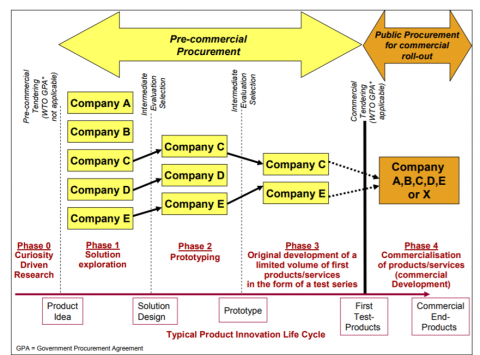Pre-commercial procurement: developing innovation capacity

About pre-commercial procurement
Pre-commercial procurement (PCP) is a demand-side innovation approach to develop R&D services with the objective to stimulate innovation. The activity is undertaken by a government or a public-private partnership, to support innovation through the purchase of R&D services, which usually includes the delivery of a ‘product prototype’ (Rigby, 2016).
The European Commission is encouraging the use of pre-commercial procurement through different directives, namely, directive 2004/18/EC and directives 2014/23 to 25/EU. PCP must respect some conditions such as:
- The scope must be limited to R&D services: R&D can cover activities such as solution exploration and design, prototyping, up to the original development of a limited volume of first products or services in the form of a test series.
- The risk-benefit must be shared with industry: the public purchaser does not reserve the R&D results exclusively for its own use. Public authorities and industry must share risks and benefits of the R&D services needed to develop new innovative solutions that outperform those available on the market.
- The PCP excludes State aid: the PCP process must be designed to ensure competition, transparency, openness, fairness, and pricing at market conditions to identify the best possible solutions the market can offer (European Commission, 2007).

Figure 1. R&D versus commercialisation phase. Source: European Commission, 2007
For public authorities, pre-commercial procurement has two main purposes. First, it aims to support their procurement needs in new services or products that do not exist in their territories. The objective is thus to conduct path-breaking research to develop a prototype of a product or service. Second, PCP aims to support the development of a product or service that will be used by public-private partnerships for public purposes. Overall, pre-commercial procurement (PCP) offers public authorities the opportunity to experiment with innovative procedures to find innovative solutions.
Public authorities that aim to design and implement pre-commercial procurement, however, face two main challenges. First, the rules are complex and there are burdensome administrative processes to design pre-commercial procurement. Second, they have risk-averse attitudes and lack of experience in developing demand-side innovation approaches.
Indeed, risk-aversion in the private and public sectors towards new policy tools can hinder the adoption of those new policy tools. Let’s see how these challenges have been successfully tackled in Latvia and Lithuania.
How Latvia defines clear procedures and shared risk
The risk-benefit must be shared with industry through including specific conditions in pre-commercial procurement. In Latvia, the State Forest designed a public procurement innovation partnership procedure to select a procurer to develop an algorithmic solution to optimise transportation logistics. The innovation partnership procedure incorporates conditions such as two contracts, one with the best applicant and the second-best applicant, to ensure that the final innovative prototype will be delivered. To include the most relevant conditions, the policymakers must pay attention to clearly define pre-commercial procurement, to select the right percentage of co-financing, and to provide capacity-building, oversight, and guidance to limit the risk of failures.
How Lithuania encourages a different mindset by reducing risk
The pre-commercial procurement support scheme is a national programme to encourage public institutions to adopt a pre-commercial procurement mindset by reducing risks. The programme provides funding up to 85% of the PCP with the remaining 15% to be financed by the contracting authority. The programme can support pre-commercial procurement at different stages from the proof or concept, to the creation of a prototype and functioning pilot system.
Capacity-building programmes for public and private actors are needed to reduce the complexity associated with pre-commercial procurement. Capacity-building support programmes have the potential to reduce risks and transaction costs related to new policy tools. The good practice 'consultations regarding innovative public procurement' is a capacity-building programme in Lithuania to support the public and the private sectors to adopt pre-commercial procurement practices, namely on the topics of how and why to implement pre-commercial procurement projects. The capacity-building support programmes are offered by experts of the Lithuanian Innovation Centre (LIC) and the Science, Innovation, and Technology Agency (MITA).
These good practices have been identified within the Interreg Europe project iBuy, which aims to foster the role of public authorities as demanders of innovation through public procurement. iBuy promotes the development of innovative models to mobilise public and private stakeholders in the area of public procurement for innovation (PPI) based on the concept of the ‘entrepreneurial discovery process’, a bottom-up approach to involve quadruple helix stakeholders setting regional priorities linked to the research and innovation strategies for smart specialisation (RIS3). iBuy aims to align innovation public procurement (IPP) programmes with European Structural and Investment Funds (ESIF) and RIS3 under the umbrella strategy of Europe 2020 and the Innovation Union.
Lean more about the Interreg Europe project iBuy and its good practices.